The 2nd HPD report - Health Policy Monitor
The 2nd HPD report - Health Policy Monitor
The 2nd HPD report - Health Policy Monitor
- TAGS
- health
- policy
- monitor
- www.hpm.org
Create successful ePaper yourself
Turn your PDF publications into a flip-book with our unique Google optimized e-Paper software.
From 1994 to 2003, prices for all pharmaceuticals were negotiated<br />
between the manufacturers’ LEEM (Les Entreprises de<br />
Médicament) and the CEPS (Comité économique des produits de<br />
santé), the economic committee on health products. Negotiations<br />
were based on a medical assessment of the drug (by the “Commission<br />
de Transparence” according to the six-tiered ASMR system)<br />
and on expected sales, research and marketing costs as well<br />
as available funds.<br />
Idea<br />
Pilot<br />
<strong>Policy</strong> Paper<br />
Legislation<br />
Adoption<br />
Evaluation<br />
Change<br />
<strong>The</strong> bill on liberalization of prices sought to exclude from this<br />
negotiation process those pharmaceuticals demonstrated to have<br />
a major added medical value. <strong>The</strong>se drugs were to be defined by<br />
ministerial order according to the ASMR determined by the<br />
“Commission de Transparence.” After intensive industry lobbying,<br />
the definition of the drugs in question was made part of the<br />
negotiations between CEPS and LEEM. CEPS merely retains the<br />
right to veto the price in the weeks after the drug is introduced to<br />
the market.<br />
<strong>The</strong> only independent journal on pharmaceuticals in France,<br />
“Prescrire,” has accused the “Commission de Transparence” of<br />
inconsistent decisions. Furthermore, the French Court of Account<br />
strongly criticized the negotiation process for lack of transparency<br />
and inability to regulate the pharmaceutical market. CEPS was<br />
suspected of favoring industry goals over health policy goals.<br />
As a result of the reform on liberalization of prices for innovative<br />
drugs, pharmaceutical companies can define prices for new<br />
innovative drugs without negotiation through public institutions.<br />
Such a policy is completely new to France. <strong>The</strong> primary aim was<br />
to advance the development and market entry of innovative medications<br />
and to accelerate patients’ access to such drugs. Whether<br />
this policy will effectively promote the development of innovative<br />
products and speed access to these drugs remains to be seen.<br />
53<br />
New products<br />
excluded from<br />
price negotiations<br />
Intransparent negotiation<br />
process<br />
New product<br />
prices no longer<br />
negotiated






